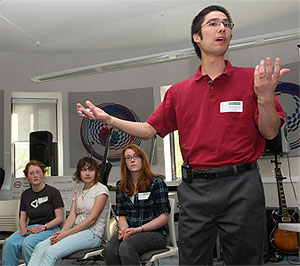 |
| ¬È∂π¥´√Ω grad Richard Hoshino, who helped start Math Circles six years ago, demonstrates how to solve a math problem using high school students in attendance at the event. (Nick Pearce Photo) |
One of ¬È∂π¥´√Ω‚Äôs most successful high school outreach programs is about to reach a whole lot more students.
Math Circles began six years ago as an initiative put together by grad students in the Department of Mathematics and Statistics under the watchful eye of Professor Richard Nowakowski. The idea was simple in theory, exciting in execution: open ¬È∂π¥´√Ω‚Äôs doors to HRM high school math students several times a year, at no cost to them, and have professors and graduate students lead them through interactive activities that demonstrate the real-world application of advanced math concepts, from game theory to cryptology.
That the program has been such a hit doesn’t surprise Dr. Nowakowski, an enthusiast in both the art and the science of teaching mathematics.
“Problem solving is so much fun!” he says with a gleam in his eye. “Everyone loves solving something – the experience of bashing your head against a brick wall and seeing it start to crumble just a bit, helping your way to the light and breaking on through.”
The program is popular not just with the students, but their teachers. “It presents problem solving in a way that’s fun, and often different than what they often get in the classroom,” explains Nicholas Down, who teaches math at J.L. Ilsley High School in Halifax. “It’s great to see what kinds of ideas these students pick up from getting to explore some of these higher intellectual concepts.”
Since 2005, Math Circles has been run by Angela Siegel, a PhD student of Dr. Nowakowski‚Äôs. As her degree program reaches its end, she‚Äôs been hired as program director to guide the Math Circles program through an expansion that hopes to leave a lasting legacy for math students across Nova Scotia. With the support of ¬È∂π¥´√Ω faculty and staff, she will be leading the development of a series of flexible, dynamic sessions that will then be taken on the road and test-driven in high schools across the province. The end result: a program that can be adapted by high school teachers as part of their own curriculum.
“What’s exciting is the opportunity to reach so many students with an interest in math that we’ve never been able to before,” says Ms. Siegel. “We’ve gotten so many requests to take part in this program, and we’ve always been disappointed that we could never bring this experience to others. And now we can – it’s like magic!”
That magic is made possible thanks to the Imperial Oil Foundation, which is donating $400,000 over four years to support the expansion of the Math Circles program.
“We’re a science-based company, 365 days a year, 24 hours a day,” said Monica Samper, president of the Imperial Oil Foundation, at an event to celebrate the arrangement last week. “We need to live in a country with a science-based population…if (Canada) wants to stay competitive, we need to spark the imaginations of this generation in the sciences and mathematics.”
For the faculty, staff and students who have made Math Circles a success thus far, achieving that “spark” in the imaginations of high school students is what drives them to make the program bigger and better.
“For me, it’s all about the smiles on high school students’ faces when they see the light, when they realize how math is useful in their daily lives,” says Ms. Siegel. "It always bothers me when I hear a student ask if they’ll ever make use of math after they’re done with school. No one who attends a Math Circles session will leave thinking that."
